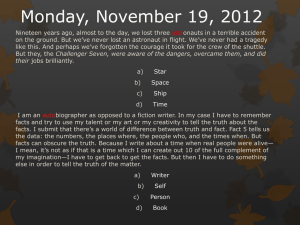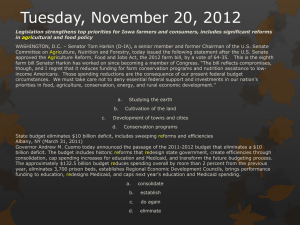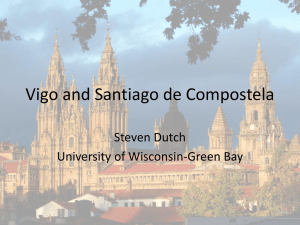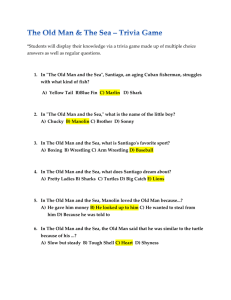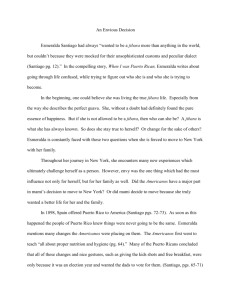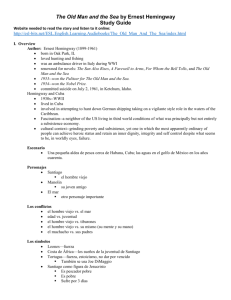The Hypostases of Nature in Ernst Hemingway`s “The Old Man and
advertisement
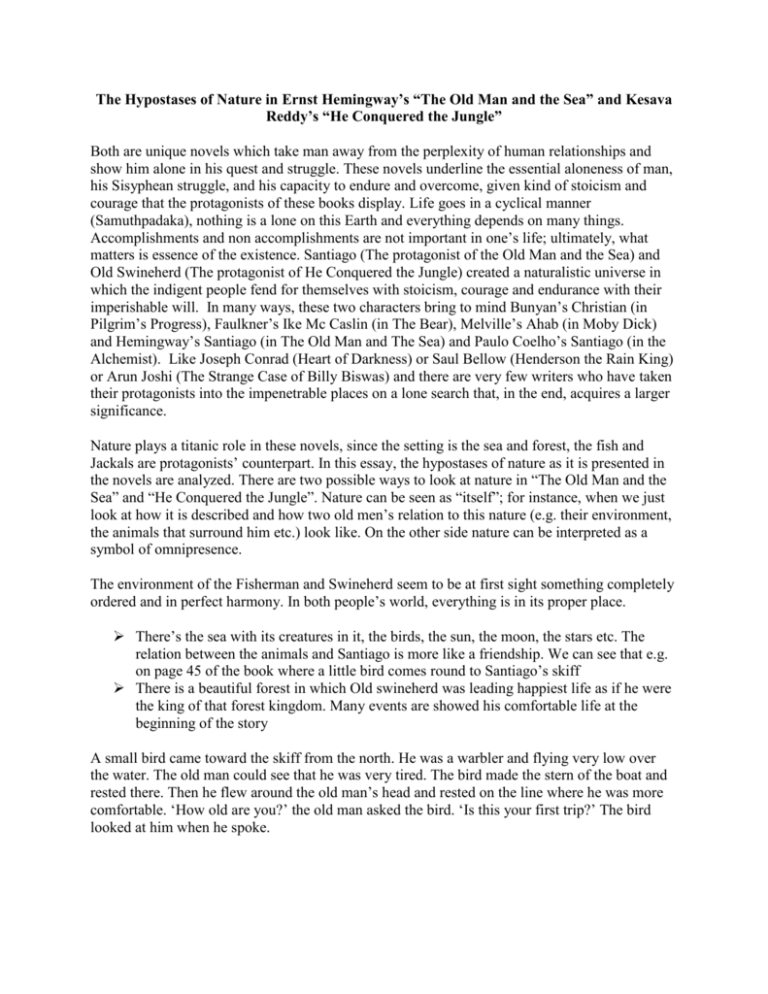
The Hypostases of Nature in Ernst Hemingway’s “The Old Man and the Sea” and Kesava Reddy’s “He Conquered the Jungle” Both are unique novels which take man away from the perplexity of human relationships and show him alone in his quest and struggle. These novels underline the essential aloneness of man, his Sisyphean struggle, and his capacity to endure and overcome, given kind of stoicism and courage that the protagonists of these books display. Life goes in a cyclical manner (Samuthpadaka), nothing is a lone on this Earth and everything depends on many things. Accomplishments and non accomplishments are not important in one’s life; ultimately, what matters is essence of the existence. Santiago (The protagonist of the Old Man and the Sea) and Old Swineherd (The protagonist of He Conquered the Jungle) created a naturalistic universe in which the indigent people fend for themselves with stoicism, courage and endurance with their imperishable will. In many ways, these two characters bring to mind Bunyan’s Christian (in Pilgrim’s Progress), Faulkner’s Ike Mc Caslin (in The Bear), Melville’s Ahab (in Moby Dick) and Hemingway’s Santiago (in The Old Man and The Sea) and Paulo Coelho’s Santiago (in the Alchemist). Like Joseph Conrad (Heart of Darkness) or Saul Bellow (Henderson the Rain King) or Arun Joshi (The Strange Case of Billy Biswas) and there are very few writers who have taken their protagonists into the impenetrable places on a lone search that, in the end, acquires a larger significance. Nature plays a titanic role in these novels, since the setting is the sea and forest, the fish and Jackals are protagonists’ counterpart. In this essay, the hypostases of nature as it is presented in the novels are analyzed. There are two possible ways to look at nature in “The Old Man and the Sea” and “He Conquered the Jungle”. Nature can be seen as “itself”; for instance, when we just look at how it is described and how two old men’s relation to this nature (e.g. their environment, the animals that surround him etc.) look like. On the other side nature can be interpreted as a symbol of omnipresence. The environment of the Fisherman and Swineherd seem to be at first sight something completely ordered and in perfect harmony. In both people’s world, everything is in its proper place. There’s the sea with its creatures in it, the birds, the sun, the moon, the stars etc. The relation between the animals and Santiago is more like a friendship. We can see that e.g. on page 45 of the book where a little bird comes round to Santiago’s skiff There is a beautiful forest in which Old swineherd was leading happiest life as if he were the king of that forest kingdom. Many events are showed his comfortable life at the beginning of the story A small bird came toward the skiff from the north. He was a warbler and flying very low over the water. The old man could see that he was very tired. The bird made the stern of the boat and rested there. Then he flew around the old man’s head and rested on the line where he was more comfortable. ‘How old are you?’ the old man asked the bird. ‘Is this your first trip?’ The bird looked at him when he spoke. It is said that truth is stranger than fiction. But the fiction under review is truth as seen by us, the never-ending series of man-made and fate-provoked disasters. Both Authors are able to capture realistically the spaces of the forest where nature is red in tooth and claw; yes, for it needs a certain sturdiness of being to digest scene where the old man spears a leaping rabbit, roasts it on a fire started with the half-open pods from a silk-cotton tree, squeezes orange juice on the cooked meat and rolls the pieces in the ashes before eating them. Kesava Reddy’s famous novel “He Conquered the Jungle’’ tells the story of a Swine herd (the old man), a poor tribal who lives somewhere in the dense forest. For 24 hours, he had struggled to save his missed Sukkalam (the best kind of a pig) and his grandson, a boy called Gopalam who went to forest to graze the pigs. On one fine day, Gopalam missed Sukkam in the forest when it was grazing at a centre point called …… and searched heaven and earth to find his Sukka, but he failed to regain the Sukkam. The old Swineherd had come to know about the missing of Sukkam and found it with its 10 piglets at the Tandra bush. There were no famous songs on this creature’s beauty and her physical charm, but Swine herd loved her as if she were friend, philosopher and guide to him. It is known fact that a Swine at the time her delivery, she is very eager to protect her piglets without having food and water at the same time she does not allow any creature to touch her babies. The old man is unique in his relationship to and understanding of the natural world. He talks about the sea as though it were a woman, the birds as friends, the sharks as personal enemies. He examines the relationship between turtles and jellyfish, between fish and birds. The creatures and the natural world become a lens through which we examine the old man; they become parables and analogies that allow us to gain insight into his character. The lions function in this same way, as they have much to do with way the old man views himself. The Old Man and Sea also incites discussion as to the natural order of things; the old man justifies and interprets his actions and the actions of others as things that they are born to do. We see a sense of inescapability in these ideas. As a fisherman who has caught nothing for the last 84 days, Santiago is a man of fighting against defeat. Yet Santiago never gives in to defeat; he sails further into the ocean than he ever has before in hopes of landing a fish, struggles with marlin for three days and nights despite immense physical pain and exhaustion, and, after catching the marlin, fights off the sharks even when it’s clear that the battle against them is hopeless. Whenever the situation gets particularly difficult and despair threatens to overwhelm Santiago, he turns to a number of tactics to fuel his resistance to defeat. He recalls memories of his youthful strength; he relies on his pride by demanding that he prove himself a worthy role model for Manolin or by comparing himself to his hero Joe.
